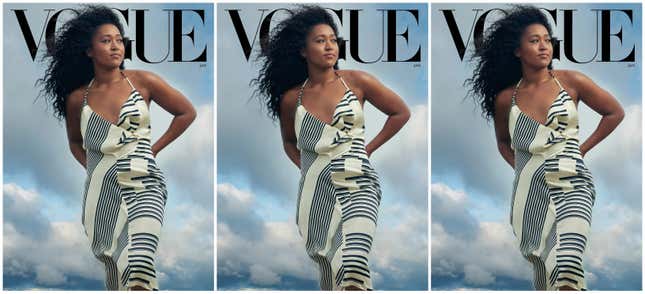
In many respects, tennis player Naomi Osaka has grown up right before our eyes. Known for being understated and shy when she first emerged as a top contender in 2018 with her surprise upset over her idol, Serena Williams, at the U.S. Open, Osaka has come into her own as one of her sport’s brightest stars. Between June 2019 and June 2020, her combined prize money and endorsements made her the highest-paid female athlete of all time, according to Forbes.
With that glow-up has come a much bigger platform, and Osaka has wielded her voice with intention and care, as evidenced in her latest debut as a cover girl, this time for none other than American Vogue.
Osaka is stunning on the cover of the January 2021 issue (one of four), photographed by Annie Leibovitz. Wearing an asymmetrical striped Louis Vuitton dress, Osaka looks like a young woman in complete possession of her talents, her natural curls lifted by a gentle breeze (or, in all likelihood, a fan), her makeup minimal and natural.
But what has made Osaka special this year is her emergence as tennis’ foremost voice on racial justice issues.
The 23-year-old spoke at length about her interest in racial justice, which began when she was just a teenager living in Florida.
“I feel like this is something that was building up in me for a while,” Osaka told the magazine. “I watched the Trayvon stuff go down. For me that was super-scary.”
As the story notes, she was 14 and living in Boca Raton, just three hours north of where Trayvon was fatally shot by George Zimmerman, an aggressive neighborhood vigilante.
“I travel so much during the year that I don’t always know the news that’s centered in the U.S. But then when the pandemic hit, there were no distractions. I was forced to look,” she continued.
Osaka participated in the Black Lives Matter protests alongside her boyfriend, rapper Cordae, in Minneapolis in the days following Floyd’s death at the hands of local police. She told Vogue it was the first rally of any kind she had ever attended.
“I don’t think it matters if you’re shy or not, or if you’re introverted or extroverted. You’re just there in the moment,” she explained. “When you see it in real life—so many cameras filming everyone, police with guns outside the city hall, the parents of other victims telling their stories—it kind of hits you differently. You’re able to process it on your own terms.”
Since then, Osaka has been vocal about the need to protect Black lives on social media and on the court. Following the Milwaukee Bucks’ impromptu wildcat strike during the NBA playoffs, she postponed her appearance at a tournament in support of the athletes. When she won this year’s U.S. Open tournament, she did so while acknowledging victims of racial violence. Each time she stepped out for a match, Osaka honored a different person by wearing their names printed on a black facemask.
Osaka’s focus on racial justice is particularly significant given her multiracial heritage. She was born in Japan to a Japanese mother and a Haitian American father, and took on her mother’s last name for practical purposes. But though she represents Japan when she plays tennis, she has spent much of her life in the United States.
This grants her a unique perspective—and an opportunity to talk about racism directly to audiences who normally don’t spend much time considering it. But while she has been attacked for her stances, Osaka is at ease with her role—even if who she is and what she stands for confuses people.
“Some people label me, and they expect me to stick to that label,” she told Vogue. “Since I represent Japan, some people just expect me to be quiet and maybe only speak about Japanese topics. I consider myself Japanese-Haitian-American. I always grew up with a little bit more Japanese heritage and culture, but I’m Black, and I live in America, and I personally didn’t think it was too far-fetched when I started talking about things that were happening here. There are things going on here that really scare me.”